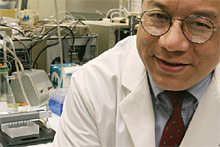Eng Endowment of $50K Supports Wilderness Studies at UC San Diego
October 17, 2007
By Paul K. Mueller

Dr. John Eng, who found a treatment for diabetes in the saliva of Gila monsters, has given $50K for wilderness studies in biology at UC San Diego, which he calls "an ideal place for the endowment."
The veterans' doctor who discovered a treatment for diabetes in the saliva of Gila monsters has given $50,000 to endow wilderness research in biology at the University of California, San Diego.
Dr. John Eng, for more than 25 years a physician and researcher at the Bronx Veterans Administration Medical Center, has established the John Eng Endowment for Wilderness Studies in the Division of Biological Sciences as a perpetual source of funding for naturalist fieldwork.
Steve Kay, Dean of the Division of Biological Sciences, praised Eng as an inspirational example for UC San Diego students. "John Eng is a fantastic role model for all scientists," he said. "He has demonstrated how a high level of success can come from working on basic science problems. His story exemplifies the purpose of and great potential for wilderness studies, and the unexpected benefits they can have for human health."
Eng made international news in 1992 when he discovered that a hormone in the venomous saliva of Gila monster lizards could be used to treat diabetes. Named exendin-4, the peptide was patented and licensed to a San Diego biotech company, Amylin Pharmaceuticals, to develop as a drug. After nine years of development and human trials to demonstrate clinical efficacy and safety, Amylin together with its alliance partner Eli Lilly won FDA approval in April 2005 to market the drug under the name Byetta as a therapeutic agent for type 2 diabetes mellitus.
"A number of factors make UC San Diego an ideal choice for the endowment," said Eng. "San Diego is bounded by ocean to the west and has wilderness and desert to the east, and it's a recognized hotbed of biotech startups and more established pharmaceutical companies devoted to making drug discoveries and developing new drugs to treat human diseases. UC San Diego is a premier research university where 20 percent of its undergraduate students major in biological sciences. What better place to foster wilderness studies and wilderness education than at UC San Diego and its surrounding environment?"
Eng said that he hopes the endowment will increase undergraduate involvement in studying wilderness and its diverse plants, animals and ecology so that, some day in the future, students will make their own discoveries just as he did.
"Dr. Eng's gift will enable students to initiate studies of organisms in wilderness environments throughout our region," said Joshua Kohn, professor of biology and chairman of the Ecology, Behavior and Evolution (EBE) section in biology. "His story is a prime example of how biodiversity can contribute to human well-being. We have only scratched the surface towards finding the many uses natural products may have for improving human health, and this is one prime motivation behind the need to conserve and study biodiversity. Funding in this area lags far behind that for laboratory biomedical research, so gifts like Dr. Eng's are greatly appreciated."
Lin Chao, professor of biology and the EBE chair during Eng's initial offer, said, "We are very grateful for Dr. Eng's interest in supporting research and education at UCSD. He serves as an outstanding role model both as a practicing scientist and a supporter of our next generation of scientists. His desire to fund wilderness research clearly indicates a deep appreciation of the breadth of biology, from grass-roots field work to designing novel molecules to fight diseases."
The Eng Endowment will support wilderness studies by UCSD undergraduates, overseen by faculty and graduate students; support wilderness presentations and lectures by faculty and graduate students to local high schools; support wilderness experiences and participation by teachers and students in local high schools; and support graduate-student training and participation in faculty research.
Giving to UC San Diego Since its founding just 45 years ago, the University of California, San Diego, has rapidly achieved status as one of the top institutions in the nation for higher education and research. One of 10 campuses in the world-renowned University of California system, UC San Diego enrolls more than 28,000 students each year and offers degrees in a variety of disciplines, including seven professional schools. Nationally ranked in the top 10 best public universities by U.S. News and World Report, UC San Diego has also been named by Newsweek as the "hottest" institution to study science. With higher education's share of state revenue declining each year, the university must increasingly rely on financial support from private sources. Gifts made by alumni, parents and friends play an important role in keeping UC San Diego at the forefront of academic and research excellence. For more information, call 858-534-1610 or visit www.giving.ucsd.edu
Media Contact: Paul K. Mueller, 858-534-8564
